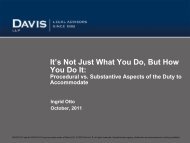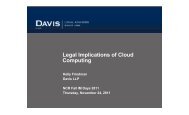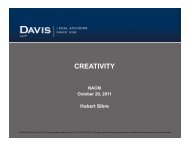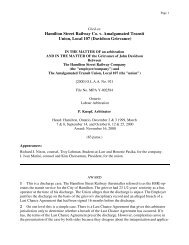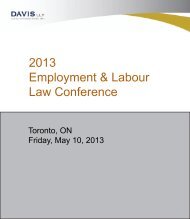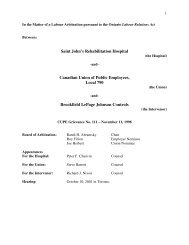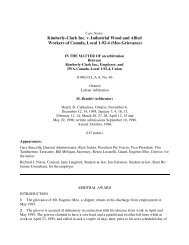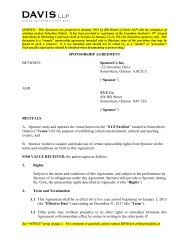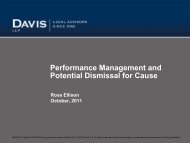Download PDF - 208 kb
Download PDF - 208 kb
Download PDF - 208 kb
You also want an ePaper? Increase the reach of your titles
YUMPU automatically turns print PDFs into web optimized ePapers that Google loves.
LEAN ON ME?: A FRANCHISOR’S S OBLIGATION<br />
TO SUPPORT ITS FRANCHISEES<br />
CANADIAN FRANCHISE ASSOCIATION<br />
WEBINAR<br />
JUNE 20, 2012
CANADIAN FRANCHISE ASSOCIATION<br />
WEBINAR<br />
JUNE 20, 2012<br />
1. How Does The Duty To Provide Support<br />
Arise?<br />
2. The Case Law<br />
3. Hypotheticals<br />
4. Best Practices<br />
5. Questions and Answers
1. How Does The Duty To Support Arise?<br />
o<br />
o<br />
o<br />
o<br />
The Franchise Agreement<br />
Duty of good faith and fair dealing (the<br />
Wishart Act & common Law)<br />
The Disclosure Document<br />
Oral & Written Representations
1. How Does The Duty To Support Arise?<br />
The Franchise Agreement<br />
• Franchises are a contractual relationship<br />
• Types and levels of support are generally determined<br />
by the language of the contract<br />
• Can include training, opening assistance, operations<br />
manual, communications, meetings and individual<br />
and local marketing.<br />
• Don’t t contractually promise what you don’t t intend on<br />
delivering.
1. How Does The Duty To Support Arise?<br />
The Duty of Good Faith and Fair Dealing<br />
• The duty arises both under statute and in common<br />
law. The statute simply codifies the common law and<br />
provides for a statutory cause of action.<br />
• The duty does not “create new, unbargained-for<br />
rights and obligations” or alter the express terms of<br />
the franchise agreement.<br />
• However, the franchisor must perform and enforce<br />
the agreement in good faith and with due regard to<br />
the interests of the franchisees and reasonable<br />
commercial standards.
1. How Does The Duty To Support Arise?<br />
The Wishart Act outlines the duty of fair dealing as<br />
follows:<br />
• s. 3(1) – every franchise agreement imposes on each<br />
party a duty of fair dealing in its performance and<br />
enforcement.<br />
• s. 3(3) – the duty of fair dealing includes the duty to<br />
act in good faith and in accordance with reasonable<br />
commercial standards.
1. How Does The Duty To Support Arise?<br />
The case law makes it clear that the franchise<br />
relationship imposes duties of “the utmost good<br />
faith”;<br />
• “Franchisors are not required to act selflessly placing<br />
the interest of the franchisee ahead of their own.<br />
However, it appears clear from the case law that a<br />
franchisor is subject to the duty to act in utmost<br />
good faith towards a franchisee” (Machias v. Mr.<br />
Submarine Ltd.)
1. How Does The Duty To Support Arise?<br />
Franchise Disclosure Documents<br />
• Disclosure documents may contain commitments<br />
concerning training (as required under the<br />
legislation).<br />
• Additional information concerning support may also<br />
be offered in these documents.<br />
• Great care should be taken, as there are statutory<br />
causes of action available for disclosure document<br />
misrepresentations (s. 7 of the Wishart Act)
1. How Does The Duty To Support Arise?<br />
Oral and Written Representations<br />
• Franchisors and their staff/sales people may make<br />
oral and written representations concerning the type<br />
and level of support offered.<br />
• This could give rise to a claim for negligent<br />
misrepresentation.
2. The Case Law<br />
What is the level of support demanded by law?<br />
• That depends...<br />
• The case law is very fact-specific.<br />
• Canadian courts will look at a variety of factors,<br />
including the franchise agreement, representations<br />
made by the parties, and the conduct of the parties.<br />
• In essence, the courts will look at fairness and<br />
whether the franchisee received the level of service<br />
that they bargained for.
2. The Case Law<br />
Machias v. Mr Submarine Ltd. (2002, Ontario)<br />
• Franchisee in Montreal claims rescission of<br />
agreement/ damages for misrepresentation.<br />
• Franchisee promised promotional support, ongoing<br />
visits.<br />
• Court held that franchisor failed to provide the<br />
promised support or deal with issues faced by<br />
franchisee in isolated market.<br />
• Plaintiff’s s claim for rescission allowed.
2. The Case Law<br />
1005633 Ontario Inc. v. Winchester Arms. Ltd.<br />
(2000, Ontario)<br />
• Franchisee brought an action for breach of contract,<br />
negligent misrepresentation and breach of the duty<br />
of good faith in case involving failed pub.<br />
• The promotional package to sell the franchise<br />
promised a fully-equipped<br />
“turnkey” pub, extensive<br />
training and ongoing support.<br />
• Little training provided, insufficient operations<br />
manual given, and franchisees left “to operate<br />
something they had not been adequately prepared to<br />
run.”<br />
• Franchisors unresponsive to requests for assistance.<br />
• Franchisor found liable.
2. The Case Law<br />
On the other hand...<br />
TRC Enterprises v. Tobmar Newstands Inc.<br />
(Gateway) (2010, Manitoba)<br />
• Franchisee had failed newsstand business in a casino<br />
and brought a claim against franchisor, alleging<br />
(among other things) misrepresentation that<br />
franchisor “had a system for doing business”.<br />
• The court held that although the support system and<br />
supervision in system were very weak, there was a<br />
system. The franchisor found the location, ordered<br />
opening inventory, trained the franchisee, assisted<br />
with the opening, and were available when called<br />
upon.
2. The Case Law<br />
Gateway (cont.)<br />
• The franchisee knows going in that the franchisor<br />
would have minimal contact with him and would not<br />
visit regularly. The franchisee also did not look for<br />
the franchisor for ongoing support.<br />
• The court examined the franchise agreement and<br />
held that although the franchisee received<br />
“shockingly little” for the monthly franchise fee, there<br />
was no breach of contract as the terms of the<br />
agreement were met.
2. The Case Law<br />
Khagen Investments Ltd. v. 710497 Ontario Ltd.<br />
(Ontario, 1999)<br />
• Franchisee sued for breach of contract and negligent<br />
misrepresentation due to failed donut shop franchise.<br />
• Franchisee complained that he received no real<br />
training, little supervision or assistance, and non-<br />
existent promotional material.<br />
• Court looked at the evidence and found that there<br />
had been training and supervision.<br />
• Operational support was not “generous”,, but did not<br />
constitute a breach of contract.
2. The Case Law<br />
Khagen (cont.)<br />
• The court held that there was insufficient evidence as<br />
to the standard of support that should have been<br />
provided, and found no evidence that the lack of<br />
support caused the business’ failure.<br />
• The plaintiff franchisee also split his time between<br />
the franchise and another business venture, and the<br />
court found that the franchisee did nothing to assist<br />
himself in ensuring the donut shop was successful.
2. The Case Law<br />
Other Cases:<br />
• Gerami v. Double Double Pizza Chicken Ltd. . (2005,<br />
Ontario)<br />
• Print Three Franchising Corp. v. McLennan Printing<br />
Inc. . (2001, Manitoba)<br />
• Bagai v. Sure Corp. (2000, Alberta)<br />
• Allegra of North America Inc. v. Stevens (2008, B.C.)<br />
• Zippy Print Enterprises Ltd. v. Pawliuk (1994, B.C.)
3. Hypotheticals<br />
#1 - Training & Support<br />
A franchisor of a national restaurant system specializing<br />
in fried chicken has implemented a system-wide change.<br />
The change involves switching from traditional deep-<br />
fryers to high-speed pressure cookers (which cost<br />
$50,000). The Franchise Agreement has a provision that<br />
the franchisees must purchase the equipment that is<br />
required by the franchisor. The franchisor has told its<br />
franchisees that the new pressure cookers will reduce<br />
cooking times as well as costs (through a reduced need<br />
for cooking oil).
3. Hypotheticals<br />
The franchisor offers a 3-day 3<br />
training course to be<br />
offered at its head-office in Burlington, Ontario and also<br />
sets up a hotline for franchisees to call with questions.<br />
One of the franchisees (Zed) can't afford to travel to<br />
Burlington for training. Zed attempts to call the hotline<br />
but is faced with severe waiting times due to the fact<br />
that there is only one employee of the franchisor fielding<br />
calls. Eventually Zed's pressure cooker is destroyed due<br />
to operator negligence. Zed cannot afford a new<br />
pressure cooker and reverts to using his deep-fryer.<br />
As a result, the franchisor terminates the franchise<br />
agreement. The franchisee counters that the franchisor<br />
failed to provide adequate support.
3. Hypotheticals<br />
#2 – Support Via The Operations Manual<br />
In its 2009 disclosure document, a franchisor says<br />
it has upgraded its operations manual from paper to<br />
electronic format which will enable up-to<br />
to-date<br />
information to be provided to franchisees on a more<br />
timely basis. Two years later, the franchisor notifies its<br />
franchisees that high online production, maintenance<br />
and administration costs prevent it from maintaining an<br />
online operations manual any longer and, instead, it<br />
will revert to a paper manual.
3. Hypotheticals<br />
At all relevant times, the franchise agreement states<br />
that the franchisor will provide an operations manual<br />
either in hard copy or electronically, in its sole<br />
discretion.<br />
The franchisees find that reversion to a paper form of<br />
ops manual has resulted in information and advice from<br />
the franchisor which is neither complete nor<br />
current. They complain about this to the franchisor,<br />
saying they want a return to the electronic manual, but<br />
the franchisor refuses. Has there been a failure of<br />
support by the franchisor?
4. Best Practices:<br />
Clear/Accurate/Flexible Disclosure Document<br />
Clear/Accurate/Flexible Franchise Agreement<br />
Training<br />
• Initial<br />
• Ongoing<br />
• Training specialized to the system.
4. Best Practices<br />
Operations Manual<br />
• Initial<br />
• Updating<br />
• Electronic?<br />
Answering questions, field support and giving<br />
advice<br />
Assistance with construction/renovation of premises<br />
• plans, specifications and supervision
4. Best Practices<br />
Maintaining internet/intranet<br />
Assistance in dealing with landlords<br />
Insurance programs and benefits<br />
Ensure franchisor employees know what support is<br />
offered and are honest and forthright with<br />
franchisees<br />
Keep records of interaction with franchisees.
5. Questions and Answers



